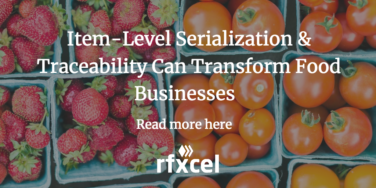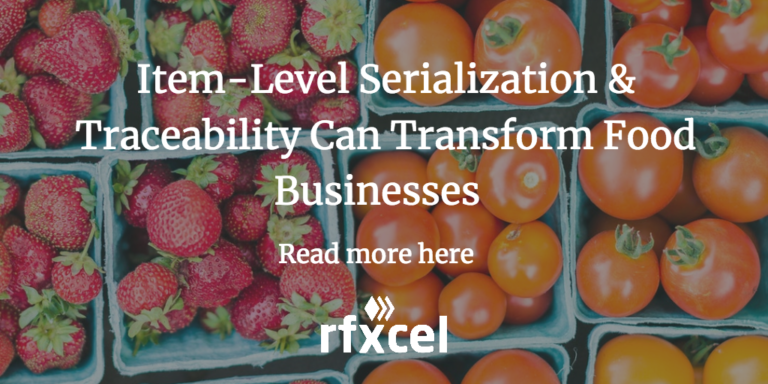The food industry is undergoing massive changes. Consumer behaviors are changing the way food companies’ source and manufacture foods. A growing amount of food dollars are looking to brands that can make – and validate – claims of local, organic, sustainable and a host of other value-added food attributes. In this environment, companies operating in the food and beverage industry need to have deep insight into their supply chains to compete. Companies that don’t know what’s happening to their products in the global marketplace are at risk, and their supply chains aren’t the assets they should be.
Digital, end-to-end serialized traceability originally developed and deployed across the global pharmaceutical industry to fight fraud and counterfeiting, provides an essential tool in winning the food game in the new food economy. End-to-end serialization helps to ensure that companies are protected today, and ready to adapt to the challenges of tomorrow.
Serialization is the process of creating a unique identifier or code for every item sold. Some estimate that serialization can add four orders of magnitude to supply chain visibility in a single step. How? Well, once products are serialized a batch is no longer just thousands of undifferentiated packs, but single, traceable items that have quality metrics associated with their data. Data about the product starting with harvest through its journey to consumer can be tracked at every stage of the supply chain.
Serious leaders in the food and beverage industry understand that item-level traceability is the future and are beginning to take advantage of what it has to offer. Importantly, the costs for implementing serialization solutions are coming down at the same time the benefits are becoming indispensable.
FIGHT FRAUD AND COUNTERFEITS
Food companies rely on brand promises to drive consumer loyalty, but Food Fraud – including mislabeling and brand counterfeiting – costs businesses $30-$40 billion a year globally. Counterfeiting in high-value products like specialty foods and spirits costs brand value. By labeling products with a unique code, consumers can validate the authenticity of products. Serialization helps to ensure that returned products are authentic, allowing for retailers or distributors to put items back on the shelf with confidence.
REDUCE IMPACTS OF CONTAMINATION OR ADULTERATION
No matter the rigor of food safety protocols, product recalls due to contamination or adulteration are still possible. However, by serializing each product, the size and scope of any recall can be reduced. Each item has a unique identifier that is put into a case which has its own unique identifier. When these cases are loaded onto a pallet, the pallet receives another unique number. By creating and following these parent-child relationships through aggregation and then de-aggregation and distribution, targeted, surgical recalls become possible, ensuring that only impacted product is pulled, while allowing for a safe product to stay on the shelf.
GENERATE SAVINGS FROM THE SUPPLY CHAIN
Getting accurate, real-time data about a product’s disposition is the driver behind the informed decision making that will allow tomorrow’s winners to leverage item-level traceability for competitive advantages.
That visibility enables a better understanding of the product flow to improve logistics and transportation efficiency, including reverse logistics, and quicker and better decisions for demand forecasting and production planning.
Being able to see exactly where products are and how long they have been there can reduce losses due to shrink, out-of-stocks and other ills of inaccurate/incomplete inventory. Companies can identify exact locations of bottlenecks in production or key QC points of failure. Any issues from customers or even consumers can be traced back to the individual item. Just-in-time inventory can become a reality.
CREATE OPPORTUNITIES TO NUTURE BRAND LOYALTY
As end-to-end digital traceability becomes the expectation of consumers, serialization will open the door to unlocking the potential of innovative food brands eager to connect with their customers in new and powerful ways.
By leveraging the unique code on each pack, marketers can use specified incentives and targeted digital messaging to connect with consumers. Companies can talk to consumers to communicate specific messages about ingredients, provenance, harvest date and other relevant information that can help build trust, including handling/testing data for the very item in hand. Couponing, incentives and other brand messages can build brand loyalty and provide targeted incentives to keep consumers coming back – the key to brand development.
Serialization has become the primary requirement in the pharmaceutical industry, and well-known companies leverage the benefits of item-level track and trace. The leaders in the food industry can realize many of these same benefits. As we’ve seen in other markets, it’s only a matter of time before the benefits of serialization become indispensable.






